Celebrate Veterans Day with Montgomery County
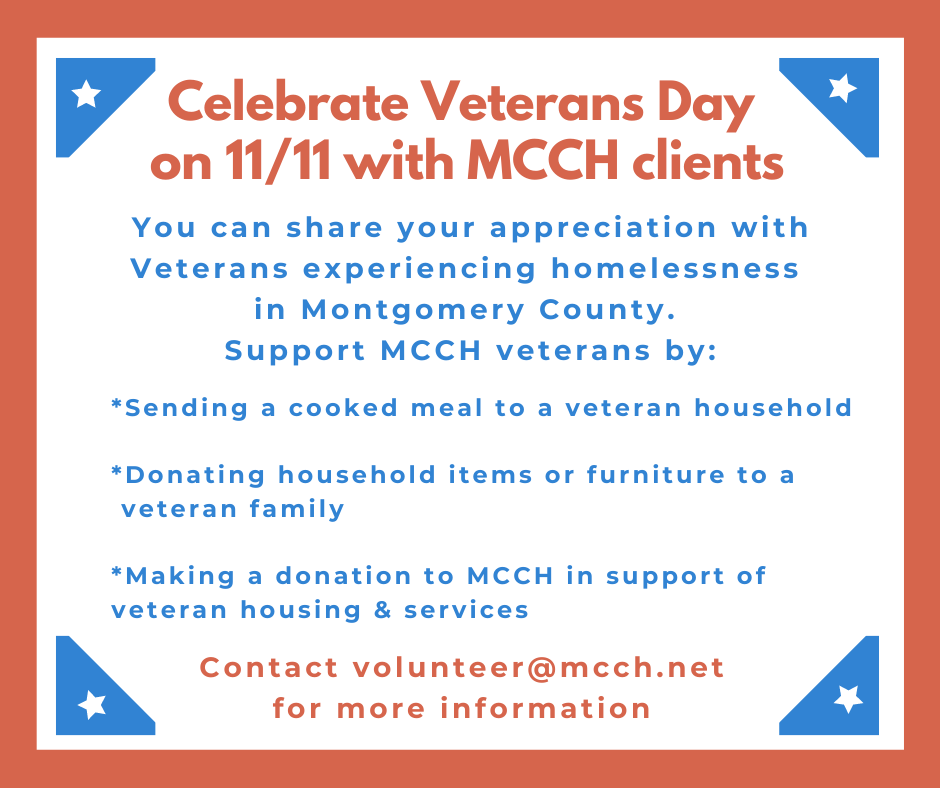

 Public Allies is a social justice organization committed to changing the face and practice of leadership by recruiting and training talented young leaders, with a passion for social impact, to create meaningful change in our community. Allies are diverse, equity-centered, innovative problem solvers, dedicated to mobilizing community assets to develop solutions to local challenges. In partnership with nonprofit partners, the organization delivers its nationally recognized, values-driven, results-led apprenticeship to advance our mission to create a just and equitable society and the diverse leadership to sustain it. Public Allies Washington, D.C. is a proud member of the AmeriCorps national service network.
Public Allies is a social justice organization committed to changing the face and practice of leadership by recruiting and training talented young leaders, with a passion for social impact, to create meaningful change in our community. Allies are diverse, equity-centered, innovative problem solvers, dedicated to mobilizing community assets to develop solutions to local challenges. In partnership with nonprofit partners, the organization delivers its nationally recognized, values-driven, results-led apprenticeship to advance our mission to create a just and equitable society and the diverse leadership to sustain it. Public Allies Washington, D.C. is a proud member of the AmeriCorps national service network.
What do Allies Do?
Allies work on capacity-building projects that are likely to have an impact beyond their terms. This can include but is not limited to: recruiting volunteers, building partnerships, expanding outreach, and launching new programs.
What do Allies Learn?
The leadership development program challenges and supports Allies to become leaders who connect across social boundaries, facilitate collaborative action, recognize and mobilize community assets, commit to continuous learning and self development, and are accountable for creating impact. Allies gain a deep knowledge of their community and important skills from local community leaders, practitioners, educators, and residents. They also learn from the diverse backgrounds, perspectives, and experiences of their fellow Allies.
For more details, check out these FAQs or visit the website.
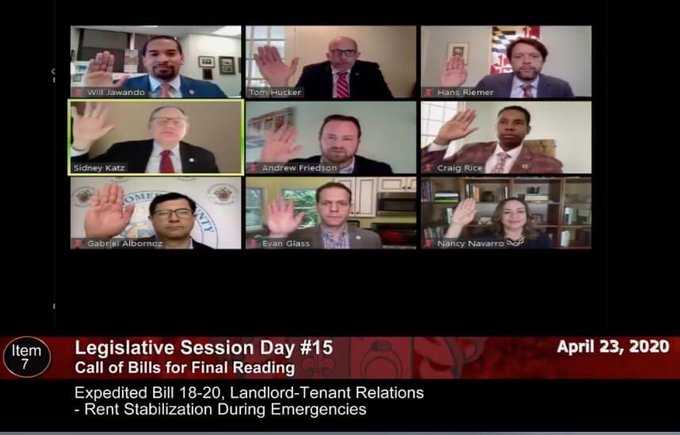
Montgomery County Council passed “The COVID-19 Renter Relief Act”, effective April 24, 2020, which prohibits landlords from increasing existing tenants’ rent by more than 2.6% after April 24 and during the COVID-19 catastrophic health emergency signed by the Governor of Maryland on March 5, 2020.
“This bill is an important step in helping our Montgomery County residents during this difficult time,” Councilmember Jawando said. “We have yet to know the full damage that will occur as a result of Covid-19 or what the actual recovery will be like for those who have lost jobs and their income. Our residents deserve the stability of knowing that their housing is protected. Today the Council has sent a strong message that our renters cannot be taken advantage of during this health crisis.”
Learn more on Montgomery County’s website.
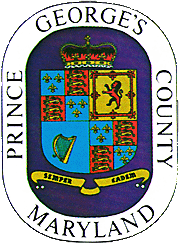 The Housing Authority of Prince George’s County (HAPGC) is soliciting proposals (RFP 2020-01) from experienced law firms and solo practitioners to provide legal services for the Housing Authority of Prince George’s County, Maryland.
The Housing Authority of Prince George’s County (HAPGC) is soliciting proposals (RFP 2020-01) from experienced law firms and solo practitioners to provide legal services for the Housing Authority of Prince George’s County, Maryland.
The Request for Proposals, including scope of work, instructions for submission and evaluation criteria are available at: Housing Authority of Prince George’s County, 9200 Basil Court, Suite 500, Largo, Maryland 20774 or by contacting Josephine Clay, Special Assistant to the Executive Director via email at: jbclay@co.pg.md.us .
The Request for Proposal is also available on HAPGC’s website http://www.princegeorgescountymd.gov/bids.aspx?bidID=73 beginning January 23, 2020. The deadline for submission is February 24, 2020 at 3:00 p.m.
The DC Department of Energy and Environment (DOEE) is currently signing up qualified District residents (those who meet the income qualifications listed below) for its Solar For All program. It aims to sign up around 2,000 District residents in the next few months. Qualified residents that sign-up receive credits on their Pepco bill of around $500 per year, which is about 50% of the average Pepco bill for District residents, allowing them to share in the benefits of clean solar power. For more information, please contact DOEE at solarforall@dc.gov or (202) 299-5271.
Washington DC residents can participate in Solar for All single family solar or community solar options if the household income is below 80% of the area median income (AMI) threshold.
| Persons in household | Income threshold |
| 1 | $67,950 |
| 2 | $77,650 |
| 3 | $87,350 |
| 4 | $97,050 |
| 5 | $104,850 |
| 6 | $112,600 |
| 7 | $120,350 |
| 8 | $128,150 |
Household income amounts listed in the eligibility table are effective as of 06/28/19, but may change.
The Maryland Department of Housing and Community Development is initiating the process to revise the Qualified Allocation Plan (QAP) and Multifamily Rental Financing Program Guide (Guide). This notice is an update about upcoming events and opportunities for you to provide feedback to this ongoing process. It is the intention of the Department to have a transparent and open process regarding the changes to the Qualified Allocation Plan and Multifamily Rental Financing Program Guide.
Since the creation of the LIHTC program in 1986, the Department has benefited greatly from the input and participation of its partners, with the end result being the production of thousands of quality affordable rental homes for low-income households across the State. As the Department moves forward in revising the Qualified Allocation Plan and Multifamily Rental Financing Program Guide, it is committed to achieving a final product that balances many competing priorities and benefits from the collective expertise and experience of interested parties.
This notice, as well as other documents and resources associated with the revision of the Qualified Allocation Plan and Multifamily Rental Financing Program Guide will be posted to the website through this process.
Beginning in September, the Department will hold a series of Regional Listening Sessions to provide an overview of the Spring 2019 Round, solicit additional comments you, as well as to engage in a dialogue regarding revisions to the Qualified Allocation Plan and Multifamily Rental Financing Program Guide. Below are the dates and locations of the Regional Listening Sessions. Please feel free to attend as many of the meetings as you wish.
Eastern Shore: Thursday, September 26, 2019 1:00 pm – 3:00 pm
Town of Denton
4 North Second Street, Denton, Maryland 21629
Southern Maryland: Tuesday, October 1, 2019 6:00 pm – 8:00 pm
Maryland Department of Housing and Community Development
7800 Harkins Road, Lanham, Maryland 20706
Western Maryland: Wednesday, October 2, 2019 10:30 am – 12:30 pm
Elgin Station Crossing Community Center
40 Elgin Boulevard, Hagerstown, Maryland 21740
Central Maryland – North: Friday, October 4, 2018, 10:00 am – 12:30 pm
300 North Apartments
300 N Warwick Ave, Baltimore, MD 21223
Following the Regional Listening Sessions, it is the Department’s goal to issue to a draft Qualified Allocation Plan and Multifamily Rental Financing Program Guide for comment during the fall. It is the Department’s goal to complete this process and adopt a new Qualified Allocation Plan and Multifamily Rental Financing Program Guide in early 2020.
The Department has established a dedicated email address for the revision of the Qualified Allocation Plan and Multifamily Rental Financing Program Guide: dhcd.qap@Maryland.gov. Please submit your comments regarding your suggested revisions to this address. Questions can be directed to 301-429-7775 or Gregory.Hare@Maryland.gov.
The Consumer Financial Protection Bureau’s proposed Debt Collection Rule is now open for comments through August 19, 2019. As drafted, the rule allows debt collectors to:
The National Consumer Law Center provides resources to tell the Consumer Financial Protection Bureau that our communities need stronger protections from abusive debt collectors. Tools include a Comment Roadmap with prompts for pulling together an impactful comment, fact sheets with state data, and an August 8 webinar in collaboration with Prosperity Now.
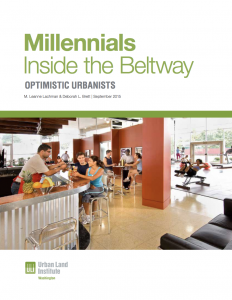 ULI Washington conducted a 2015 Millennial Study to find out the influence that the Millennial generation is having on the underlying fundamental values in Washington and its close-in suburbs. While it is difficult to predict whether their presence will truly shift our ways of living, working, and collaborating, this survey sought to examine how the generation might influence trends in housing, entertainment, retail and transportation because of their entrepreneurial spirit and the rise of the sharing economy. There is also interest in how their needs will change as they grow older and form families. The 2015 survey served as a baseline to track trends over time, especially as more Millennials marry and have children. The survey also provided information for public officials and the real estate industry as they create policies and products to respond to the needs of this cohort.
ULI Washington conducted a 2015 Millennial Study to find out the influence that the Millennial generation is having on the underlying fundamental values in Washington and its close-in suburbs. While it is difficult to predict whether their presence will truly shift our ways of living, working, and collaborating, this survey sought to examine how the generation might influence trends in housing, entertainment, retail and transportation because of their entrepreneurial spirit and the rise of the sharing economy. There is also interest in how their needs will change as they grow older and form families. The 2015 survey served as a baseline to track trends over time, especially as more Millennials marry and have children. The survey also provided information for public officials and the real estate industry as they create policies and products to respond to the needs of this cohort.
Three years have passed since the first report and ULI is conducting the study again to see how the baseline information has changed over that time. In 2015, there were over 1,300 respondents. The survey screens potential respondents to be sure they are in the desired survey cohort who are under 35 living within specific zip codes within the Beltway.
If you would like to participate, visit this link, and also share with your colleagues, constituents and friends. The survey takes less than 10 minutes to complete and will be open for at least the next two weeks.
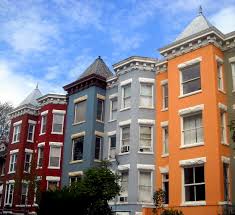 Earlier this year, HAND along with several of its members and partners, signed onto revisions to DC’s Comprehensive Plan. The plan is a document that our local leaders use to guide how the city will grow and change in the coming decades. The coalition recently completed and submitted its amendment package, which fundamentally aims to improve the Comp Plan to build more homes, build and preserve more affordable homes, and provide better protections against displacement. The group that drafted the package included DC Fiscal Policy Institute (DCFPI), Coalition for Nonprofit Housing and Economic Development (CNHED), Coalition for Smarter Growth (CSG), MidAtlantic Realty Partners (MRP) and EYA.
Earlier this year, HAND along with several of its members and partners, signed onto revisions to DC’s Comprehensive Plan. The plan is a document that our local leaders use to guide how the city will grow and change in the coming decades. The coalition recently completed and submitted its amendment package, which fundamentally aims to improve the Comp Plan to build more homes, build and preserve more affordable homes, and provide better protections against displacement. The group that drafted the package included DC Fiscal Policy Institute (DCFPI), Coalition for Nonprofit Housing and Economic Development (CNHED), Coalition for Smarter Growth (CSG), MidAtlantic Realty Partners (MRP) and EYA.
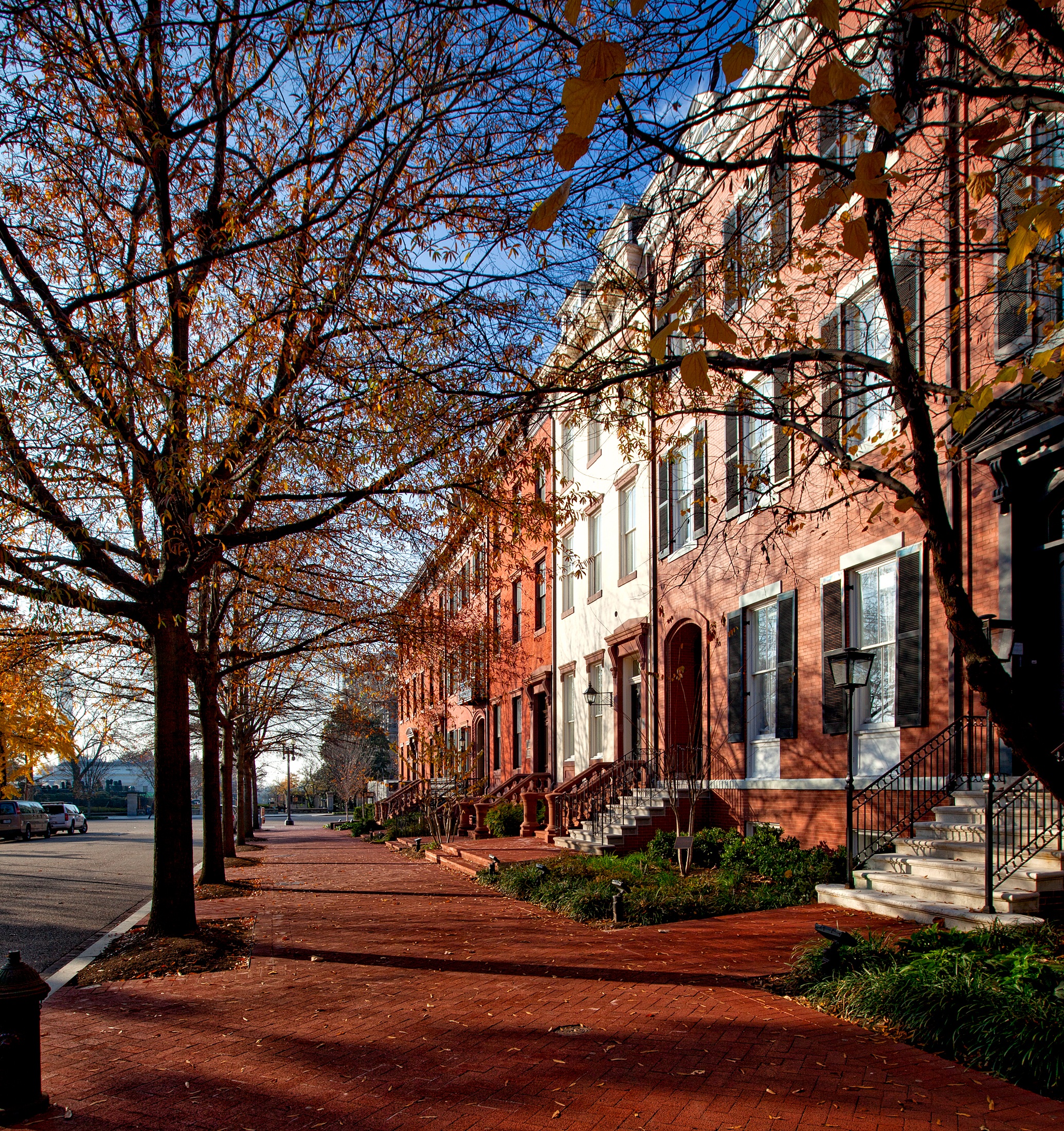
Monday, October 23, 2017 | 9:00am – 5:00pm
District Architecture Center
421 7th Street NW (Gallery Place/Archives Metro)
Washington, DC
$25 to attend (includes coffee and lunch)
Scholarships available!
Amid DC’s housing affordability crisis, one solution stands out: flexible, outside-the-box ways to increase housing supply. Accessory dwelling units (ADUs) have potential to be one flexible solution.
ADUs improve sustainability by creating more resource-efficient housing; improve housing affordability by adding new supply in previously inaccessible places; and reap both social and financial benefits by promoting intergenerational shared housing for homeowners and renters.
Homeowners still face a series of practical barriers to building ADUs on their property: determining appropriate design options, assessing feasibility, securing financing, navigating the permitting process, developing working relationships with architects and builders, managing the construction process, and ongoing property management.
Presented by the Coalition for SmarterGrowth, DC ADU Workgroup, AIA|DC, and ULI Washington, “Reinventing the Home: How accessory dwelling units (ADUs) can be a bigger part of the housing solution for DC” will convene resources, experience, and stakeholders to begin to address these challenges, and bring ADUs, as a new generation of housing supply, to scale in the District of Columbia. Learn more about this event and register here.
[custom-facebook-feed]
Payments: Orders placed on the event registration page are not confirmed until payment is received. A confirmation email will be sent to the email address listed in your registration. If you paid by credit card, a receipt will be sent to the email address listed in your registration. If you mail a check, all payments must be received within seven days of completing your registration form. Checks should be remitted to: HAND, PO Box 48386, Washington, DC 20002
Guest List & Dietary Preference: If your registration includes a luncheon table or multiple guests, please submit guest names and menu choices by May 1, 2020. Submit guest names here.
Housing Expo: Plan to exhibit? Download the Housing Expo FAQs here.
Omni Shoreham Hotel Room Block: For attendees looking to secure overnight accommodations on May 25th, HAND has secured a rate starting at $189 for conference attendees. There are a limited amount of rooms available, so visit this link today to reserve your room. May 10th is the last day to secure a room at the discounted rate.
Ad Submission: The artwork for advertisements should be submitted to annualmeeting@handhousing.org. You can download the ad spec sheet here. Deadline for ad submission is April 13, 2020.
Cancellations & Changes: If you wish to cancel or change your registration for the Annual Meeting & Housing Expo, please send a request in writing to annualmeeting@handhousing.org. All cancellation requests made prior to April 27th will receive a 50% refund. For cancellation requests made after April 27th, no refund will be provided.
Door Prizes: Are you interested in donating a door prize to this year’s Annual Meeting? Email annualmeeting@handhousing.org to coordinate with our team.
Mailing Address:
HAND
1330 New Hampshire Avenue NW, Suite 124
Washington, DC 20036
info@handhousing.org
202.384.3764
Staff Directory
MEDIA INQUIRIES?
communications@handhousing.org
INTERESTED IN HAND UPDATES?
Sign up for the distribution list here.
